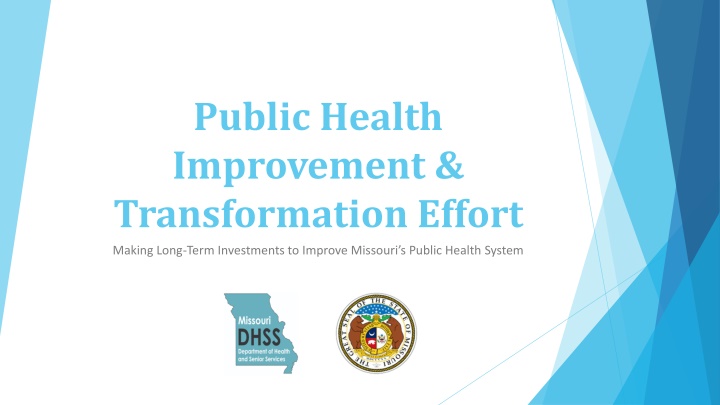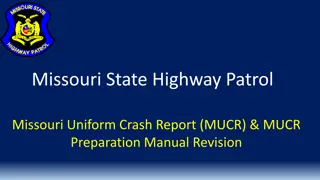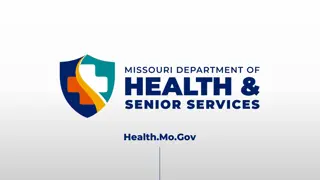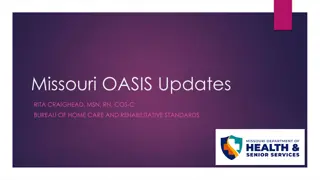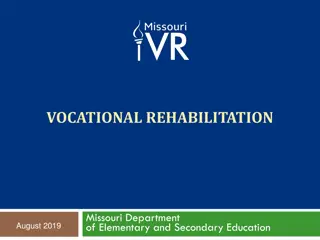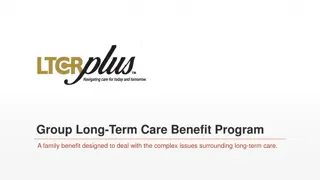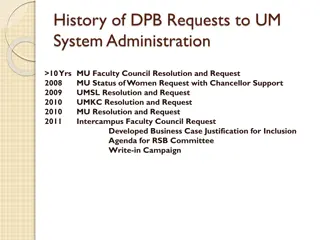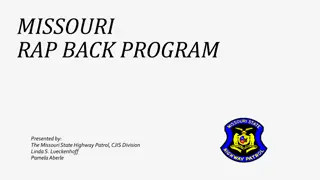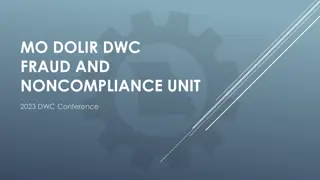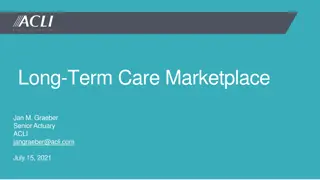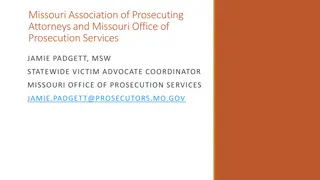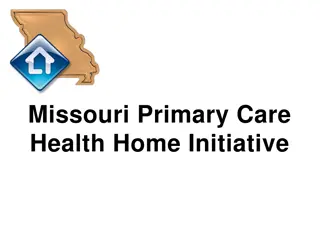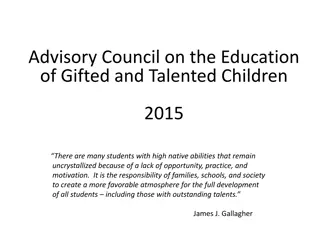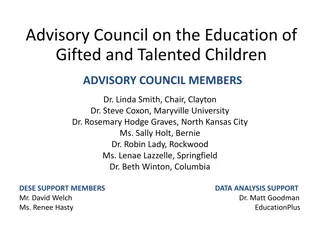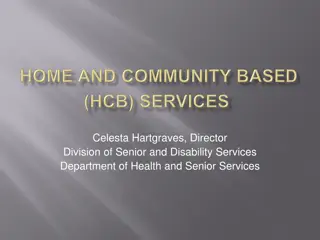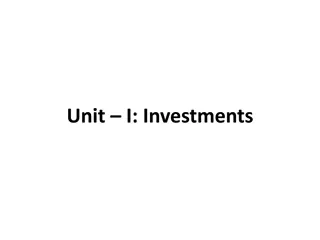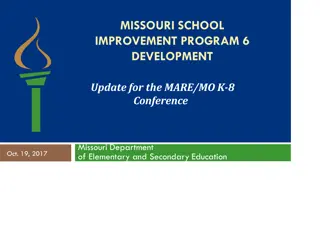Long-Term Investments for Missouri's Public Health Improvement
Engage in a Public Health Improvement & Transformation Effort to make lasting investments in Missouri's public health system. The focus includes policy development, organizational competencies, accountability, emergency preparedness, community partnerships, and more. The goal is to establish evidence-based policy recommendations and support projects like Public Health System Alignment, State Reporting Compliance, and Procurement Process Assessment.
Download Presentation

Please find below an Image/Link to download the presentation.
The content on the website is provided AS IS for your information and personal use only. It may not be sold, licensed, or shared on other websites without obtaining consent from the author.If you encounter any issues during the download, it is possible that the publisher has removed the file from their server.
You are allowed to download the files provided on this website for personal or commercial use, subject to the condition that they are used lawfully. All files are the property of their respective owners.
The content on the website is provided AS IS for your information and personal use only. It may not be sold, licensed, or shared on other websites without obtaining consent from the author.
E N D
Presentation Transcript
Public Health Improvement & Transformation Effort Making Long-Term Investments to Improve Missouri s Public Health System
Agenda 10:00 10:05 Welcome 10:05 11:00 Group Presentations Policy Development & Support Organizational Administrative Competencies Accountability & Performance Management Assessment & Surveillance Emergency Preparedness & Response Community Partnership Development Communications 11:00 12:00 Closing Remarks & Lunch
Organization of Work Groups Organized by foundational capability area: Policy Development & Support Organizational Administrative Competencies Accountability & Performance Management Assessment & Surveillance Emergency Preparedness & Response Community Partnership Development Communications
Policy Development & Support Angie Brenner, DHSS WIC Clay Goddard, MFH Val Huhn, DMH Daniel Lensing, OA B&P Laura Naught, DHSS MSPHL Tony Pierce, DHSS BEE Michael Oldweiler, DHSS OGC
Policy Development and Support Goal Every public health agency should serve as an expert resource for establishing, maintaining, and developing basic public health policy recommendations that are evidence-based, grounded in law, and legally defendable. Includes researching, analyzing, cost determination, and articulating the impact of such policies and rules where appropriate, as well as the ability to organize support for these policies and rules and place them before an entity with the legal authority to adopt them.
Policy Development and Support Projects #1: Public Health System Alignment #2: State Reporting Compliance #3: Procurement Process Assessment
Project #1: Public Health System Alignment Lines of Effort Develop and enhance the State-wide Health Improvement Plan (SHIP) and support Community Health Improvement Plans (CHIP) by strengthening the SHIP process and providing funding to enhance SHIP and CHIP activities to ensure and support success. Create minimum standards and consistency of processes across the public health system. Build a robust public health system through universal LPHA accreditation either through the Public Health Accreditation Board (PHAB) or the Missouri Institute for Community Health (MICH).
Project #1: Public Health System Alignment Lines of Effort (cont d) Identify tools and processes to improve consistency across the public health system. Identify enhanced public health strategies by creating a statewide Chief Health Strategist and regional liaisons across the public health system. Realign the public health system regional map to better serve Missouri citizens.
Project #2: State Reporting Compliance Lines of Effort Review all state statutes and rules to determine enforceability and if incentives/penalties improve public health reporting. Ensure all appropriate public health data are reported as stated and comply with state statutes and rules.
Project #3: Procurement Process Assessment Lines of Effort Evaluate the overall procurement and contract process statewide to identify gaps and opportunities for improvement to: Create consistency of processes throughout the state system Identify non-value added steps and eliminate Improve timeliness of procurement processes
Administrative Competencies Marcia Mahaney, DHSS Administration Pat Bedell, DHSS Administration Stacey Hirst, DED Administration Paula Peters, OA ITSD Christine Clark, OA B&P Mulima Walusiku, DHSS DCPH Shelley Williamson, DHSS DRL Spring Schmidt, St. Louis Co. PHD Adam Crumbliss, DHSS DCPH
Administrative Competencies Goal Establish an integrated administrative system that synthesizes success from best practices across all sectors to enhance the capability of our state and local communities to effectively plan for, engage, and respond to public health needs across a diverse array of stakeholders. Drive change and innovation toward the creation, attraction, and retention of an effective workforce, create alignment through governance structures, and utilize technology and administrative infrastructure to reduce administrative burdens to public health response.
Administrative Competencies Projects Project #1: Establish and Align Public Health Governance Systems Project #2: Develop Strategic Planning Process from Ongoing Processes Project #3: Execute Operational Excellence and Performance Improvement Project #4: Engage New Approaches to Public Health Funding Project #5: Integrate Data Structures Strategies for Technological Advancement Project #6: Implement Local Public Health Assessment and Improvement Project #7: Design a Long-Term Public Health Professional Pipeline
Administrative Competencies Underpinning Dependencies Identify and engage stakeholders on each line of effort and the development of strategic communication planning Establish interdisciplinary teams across DHSS and other state agencies related to customer engagement and citizen experience. Statutory and regulatory review All success will require S.M.A.R.T. objectives and deliberate execution.
Administrative Competencies Project#1: Public Health Governance Structures Engage the Newly-Appointed State Board of Health Re-establish Stakeholder Advisory Groups at Both the DHSS level and the DCPH level Establish a DHSS-Wide Grants Management Team Expand the Existing Operational Excellence Team Establish a Strategic Data Officer and Advisory Structure Re-Align and Expand the Center of Local Public Health Services
Administrative Competencies Project#2: Strategic Planning Engagement Public health strategic plan alignment and execution Reduce overlap and better align ongoing assessment and accreditation processes across the public health system Invest in expanded PHAB and MICH public health accreditation processes Ensure strategic planning is a living and ongoing process
Administrative Competencies Project #3: Operational Excellence & Performance Improvement Establish 6 new positions within DHSS to expand operational excellence and performance management initiatives Required training in advanced operational excellence efforts Establish operational excellence pathways to expand training opportunities for Local Public Health Agencies Expand the MO Learning and other learning management system platforms all Local Public Health Agencies
Administrative Competencies Project #4: New Public Health Funding Strategies Establish DHSS Grants Team Establish a DHSS grants management system New systems to optimize accounting and reporting processes between DHSS, partner agencies, and other vendors or contractors Work with external vendors to identify and engage new strategies for working through federal grant applications
Administrative Competencies Project#5: Engaging New Data Strategies & Technology Opportunities Establish a DHSS Strategic Data Officer Enhance collaboration with other state agencies and partners to provide enterprise-wide data capabilities Assess and eliminate duplication of data sharing agreements and establish consistent data access agreements Establish a long-term pathway for developing an enhanced data management structure Assess the existing and projected technological needs of the public health system and integrate acquisition into the DHSS strategic planning process
Administrative Competencies Project#6: Assessing and Improving Public Health at the Community Level Engage an external partner to survey and assess all public health agencies Establish an integrated public health expertise model Enhance ongoing education and professional development for local public health partners Re-alignment of public health regions to ensure integration and alignment of health resources with local public health partners
Administrative Competencies Project#7: Design and Implement the Public Health Professional Pipeline Expand DHSS Analytics team Conduct a needs assessment on public health workforce landscape Develop partnerships to create educational programs in K-12 school districts to increase interest in public healthcare as a career path. Identify and overcome barriers for students interested in public health as a career Review salary levels of public-health related jobs and instructor salary caps to identify barriers Develop a national media marketing campaign to promote public health as a career and showcase opportunities in Missouri Collaborate with professional associations, public health academic institutions, and other public health entities to attract, retain, and develop talent in the public health workforce
Accountability & Performance Management Paul Eisenstein, DED, Strategy & Performance Division Venkata Garikapaty, DHSS, Section of Epidemiology for Public Health Practice JoAnn Harbison, OA ITSD, Becky Hunt, Madison County Health Department Cheryl Kerr, DHSS, DCPH Lee Pearson, DHSS, Office of Performance Management Maddie Starnes, OA B&P
Accountability & Performance Management Goals To ensure that DHSS & LPHAs: Are following accepted business standards, integrating evidence- based practices, and maintaining an organizational culture of continuous quality improvement. Are able to assume responsibility for public health actions in accordance with relevant local, state, and federal laws and policies and to assure compliance with state (Missouri Institute for Community Health) and / or national (Public Health Accreditation Board) standards.
Accountability & Performance Management Projects Project#1: Data Infrastructure & Analytics Project#2: Continuous Improvement Project#3: Dashboards & Data Dissemination
Data Infrastructure & Analytics Lines of Effort Increase number of public health data analysts and informaticists Ensure staffing available for data analysis requirements for surveillance and assessment efforts DHSS inter-departmental research and analysis team Create team to assist various areas of the department (beyond DCPH) Enhance data collection, analysis and skill sets at county / regional levels Increase surveillance capacity at county / regional levels using existing / new data collections tools (county-level study) Trainings at county level to enhance analytical skills sets for LPHA staff
Data Infrastructure & Analytics Lines of Effort (cont d) Procure and train on analytics tools at DHSS / LPHAs Procure, implement, and train on data dissemination and dash boarding tools at DHSS / LPHAs Inventory DHSS data assets and assess DHSS application portfolio (Inter-departmental Research & Analysis Team) Develop a strategic roadmap for improvements in data systems supporting collection, analysis, reporting and data interoperability (Health Data Strategy Officer)
Data Infrastructure & Analytics Continuous Improvement and Dashboards Continuous Improvement trainings with a Lean Six Sigma Focus for LPHA staff DHSS Lean Six Sigma team to provide regional trainings for all LPHAs with a Lean Six Sigma focus Build out an Accreditation Standards Dashboard with alignment of the State Health Improvement Plan Goal is to enable DHSS to identify potential training needs for LPHAs based on MICH and PHAB standards
Assessment & Surveillance Julie Boeckman, DHSS ODH John Bos, DHSS BCDCP Scott Clardy, Columbia/Boone County Public Health and Human Services Dr. Guy Deyton, DHSS ODH Matt Hesser, OA Jami Kiesling, DHSS BGHC Alicia Jenkins, DHSS BHSH
Assessment & Surveillance Goal: Enhance the public health surveillance system to ensure state and local public health agencies are able to efficiently and effectively collect, analyze, interpret, and communicate health-related data to facilitate the prevention and control of disease. Projects: Testing Contract tracing and monitoring Sewershed Electronic disease reporting Comprehensive immunization registry improvements Increase epidemiology capacity and capabilities Enhance surveillance, investigation, prevention and response to COVID-19 and other healthcare-associated infections
Assessment & Surveillance Projects Testing K-12 COVID-19 Screening Testing Box In Testing Strategy Sentinel Testing Strategy Community Testing Strategy IDNow and BinaxNow Test Kits Mobile Van Personnel and Expenses Expanding Testing Capabilities to Meet Surveillance Needs Regional Public Health Laboratories Contact Tracing and Monitoring Data collection to facilitate case investigation, contact tracing, implementation of control measures Case investigation/contract tracing platform that integrates with EpiTrax. Contract tracers available to support contact tracing efforts
Assessment & Surveillance Projects (cont d) Sewershed Covid-19 Detection in Community Wastewater Comprehensive Immunization Registry Improvements School Health Staff Enter Immunization Records into ShowMeVax Connection of School Immunization Electronic Health Record (EHR) Systems to report to ShowMeVax Expanding Data Sharing Agreements with States Enhance Data Access for Local Public Health Agencies Enhance Data Analysis Capabilities Targeted Messaging Campaign to Healthcare Professionals
Assessment & Surveillance Projects (cont d) Electronic Disease Reporting Disease Surveillance Business Analysis Infectious and Environmental Disease Surveillance System Enhance LPHA Connectivity Electronic Laboratory Reporting Communicable Disease Reporting Compliance Assessment
Assessment & Surveillance Projects (cont d) Increase Epidemiology Capacity/Capabilities Increase number of available epidemiologist and clinical epidemiologists at DHSS Added epidemiology capacity at local level through the development of regional concept and direct funding to LPHAs to add disease investigators Enhanced Education and Training for Public Health Epidemiologists Integrated Epidemiology Excellence Network Contract Reserve for Specialized Public Health Subject Matter Expertise in Epidemiology Enhance Surveillance, Investigation, Prevention, and Response to COVID-19 and Other Healthcare-associated Infections (HAI) Expand Missouri s HAI Program to enhance surveillance and control of COVID- 19 and other emerging HAI in the healthcare setting (Hospitals and Long Term Care Facilities) Strike Teams for Resident and Employee Safety in Skilled Nursing Facilities
Emergency Preparedness & Response Paula Nickelson, DHSS, OEC Jackie Gatz, MHA Steve Bollin, DHSS DRL Steve Cramer, DHSS DCPH Eric Hueste, DHSS DCPH Rodney Hummer, MPCA Elizabeth Weyrauch, SEMA Mara Woody, DHEWD
Emergency Preparedness & Response Goal Facilitate the implementation of a comprehensive preparedness structure to allow state and local Emergency Support Function-8 (ESF-8) lead agencies to adopt and execute an all-hazards approach to manage incidents impacting public health and health care.
Emergency Preparedness & Response Projects Project #1: Workforce Development Workforce Analysis of Public Health Emergency Preparedness Staff Develop Missouri ESF-8 Orientation Convene in-person with state-wide ESF-8 stakeholders Develop competency-based training tracks for public health emergency preparedness personnel Evaluate role and efficacy of FEMA preparedness trainings
Emergency Preparedness & Response Projects (cont d) Project #2: Supply Chain Management Maintain state-operated warehouse for PPE and testing supplies Integrated Warehouse Inventory Management and Resource Tracking System - create integrated software system or purchase commercially available system to manage consumable supplies and durable assets housed within the state PPE Reserve warehouse. Conduct a statewide supply chain integrity assessment and develop ongoing method for supply chain awareness Project #3: Maximize Emergency Preparedness Funding for ESF-8 Nurture a culture of inter-agency collaboration related to public health emergency preparedness funding efforts
Emergency Preparedness & Response Projects (cont d) Project #4: Evaluate Incident Management Models Evaluate Fusion Cell-type command-control model for future uses Project #5: Improving Disaster Management Information Sharing Analyze and improve all statewide incident management electronic platform operability and interoperability Operationalize Essential Elements of Information for public health/healthcare emergency response Project #6: Assure emergency preparedness/response is incorporated into CHNAs/CHAs state-wide Create awareness for the role of emergency preparedness and response in the community health needs assessment process
Emergency Preparedness & Response Projects (cont d) Project #7: Laboratory Capacity Maintain laboratory capacity and expand preparedness replace aging equipment, preventive maintenance Increase state agency laboratory testing expand testing capabilities MSPHL renovation project - molecular and mailroom areas DNR laboratory renovation - large, temperature-controlled holding area for public drinking water and environmental health samples Increase state laboratory testing infrastructure - feasibility and viability of creating a centralized laboratory campus made up of these multi-departmental state laboratories MSPHL/MDA/DNR laboratory testing facilities - Provide additional space for current and future needs of state agency laboratories
Community Partnership Development Regional Public Health Liaisons (RPHLs) + Team Sara Hart Weir, DHSS Melanie Highland, DHSS Brent McGinty, MOBHC Joe Pierle, MPCA Kristi Campbell, Cole County HD Katie Plax, WUSTL Rachel Orscheln, WUSTL Kathleen Quinn, Univ. of Missouri Kim Sprenger, Univ. of Missouri Lynnelle Phillips, Univ. of Missouri Community Partnership Grant Program Public Health Best Practices 41
Community Partnership Development Goals Community Partnership Development is to link Missouri s Public Health System to the State s Health Care Systems, including: Medical Systems Academic Health Systems Dental Community Behavioral Health Community Educational Systems Improve, enhance and sustain bi-directional relationships with key community partners and stakeholders from DHSS to state associations, non-profit organizations, faith-based communities, Chambers of Commerce, to social service organizations, and everywhere in between. Through this effort, focus on improving health equity and access for Missouri s underserved and underrepresented populations (i.e., rural, minority, disability, homeless, homebound, uninsured/under-insured, and seniors). 42
Community Partnership Development Goals (cont d) Serve as the Link Public Health to Health Care Systems Improving Health Equity & Access (with a focus on the underserved + under- represented communities
Community Partnership Development Project: Regional Public Health Liaisons Regional Public Health Liaisons (RPHLs) + Team DHSS/RPHL & Stakeholder Map Assessment (kick-off + annual review) Conduct a comprehensive MAP ASSESSMENT of all community stakeholders and engage entities and organizations that are not currently involved in public health. Bi-Directional Community Partnerships (ongoing) Dedicated staff to ensure community partnerships are purposeful, collaborative, and bi-directional. Serve as a "Consortium Organizer" within each region and convene known partners and community stakeholders and facilitate group discussions to find commonalities and further opportunities to partner across organizations. RPHL Team would then facilitate a full review of existing Missouri needs assessments and improvement plans and align with a comprehensive environmental scan of communities/stakeholder organizations in MO to identify gaps in key relationships and partners, commonalities across regions/counties, identify needed interventions and put forward a roadmap of RPHL engagement, goals, and tactics. 10 contracted RPHLs will be located in each Missouri region and DHSS would employ 1 FTE to oversee this line of effort (i.e., State RPHL Coordinator). Serve as quasi-public face of each region when needed to speak to public health concerns (possible Communications function). In order to sustain these bi-directional partnerships, the RPHL Team will conduct on going discussions with stakeholders around how to sustain funding of the RPHL functions long-term and roadmap/plan will be reviewed on an annual basis for continuous improvement. State RPHL coordinator would work to facilitate discussions across region lines and to share best practices regarding community development opportunities while also providing the link between the regions and the state. 44
Community Partnership Development Project: Grant Program Lead: DHSS/RPHLs Team Goal: Provide additional funding to support community needs while supporting the statewide public health goals and infrastructure Eligibility Grantees: Range from LPHAs to statewide, regional, and local partners and stakeholders Grant Requirements: Grant proposals would be supported initially with 100% federal funds, but include a gradual phase-in of local cost sharing. This would help communities pilot initiatives and encourage local contributions to support initiatives that have measurable successes and are valued in their respective community. Community Partnership Grant Program Opportunities to Replicate Success (across other regions/counties) Diversity, Equity, + Inclusion (DEI) components Grant Objectives + Outcomes Accountability Measurements Data Collection + Outputs 45
Public Health Best Practices are Incorporated into Existing Professional Conferences Develop and share Best-in-Class Public Health Practices Health Care GOAL: Spur interest in public health among related fields and increase opportunities for learners to engage with experts in the public health arena SCOPE: DHSS/RPHL Team would work with community stakeholders to deploy resources at existing conferences held on topics related to public health to: Promote evidence-based public health practices Spur innovation and technology Enhance statewide training and capacity Education Education Seniors Public Health PUBLIC HEALTH ALIGNMENT: RPHL Team will work in a complementary manner to align new conference scope/goals with the three established public health conferences held annually in Missouri: MO Public Health Conference (MOALPHA, MOCPHE, and MPHA) MO Environmental Health Association Conference MO Immunization Coalition (online conference) 1) 2) 3) Economic Development Disability Services 46
Communications Lisa Cox, DHSS, Jeff Howell, MSMA Mallory McGowin, DESE Scott Odum, DSS DYS Martha Smith, DHSS DCPH Alex Tuttle, DHSS
Communications Goals Build public understanding to support the state s public health objectives and share public health information with the public. Define customers and develop an engagement strategy that fits all involved parties. Redesign public health operating models and create effective communications strategies that fit the needs of stakeholders and customers. Develop a customer stakeholder engagement and communication strategy while training employees on necessary skill sets.
Communications All public health improvement and transformation efforts will tie in to the communications function. Solid communications strategies among partners and all Missourians are vital to the success of our efforts. The communications team will work to support all functional areas of Missouri s public health transformation.
Communications Projects & Lines of Effort Enhance DHSS digital communications platform Design and build a new DHSS website/content management system in Drupal with support from OA-ITSD Obtain a customer relationship management/email marketing platform to communicate with a targeted approach with stakeholders and offer subscription options. Establish clear processes to develop and maintain stakeholder groups and lists Develop interagency communication mechanism with plans to share all appropriate messages with respective partners
